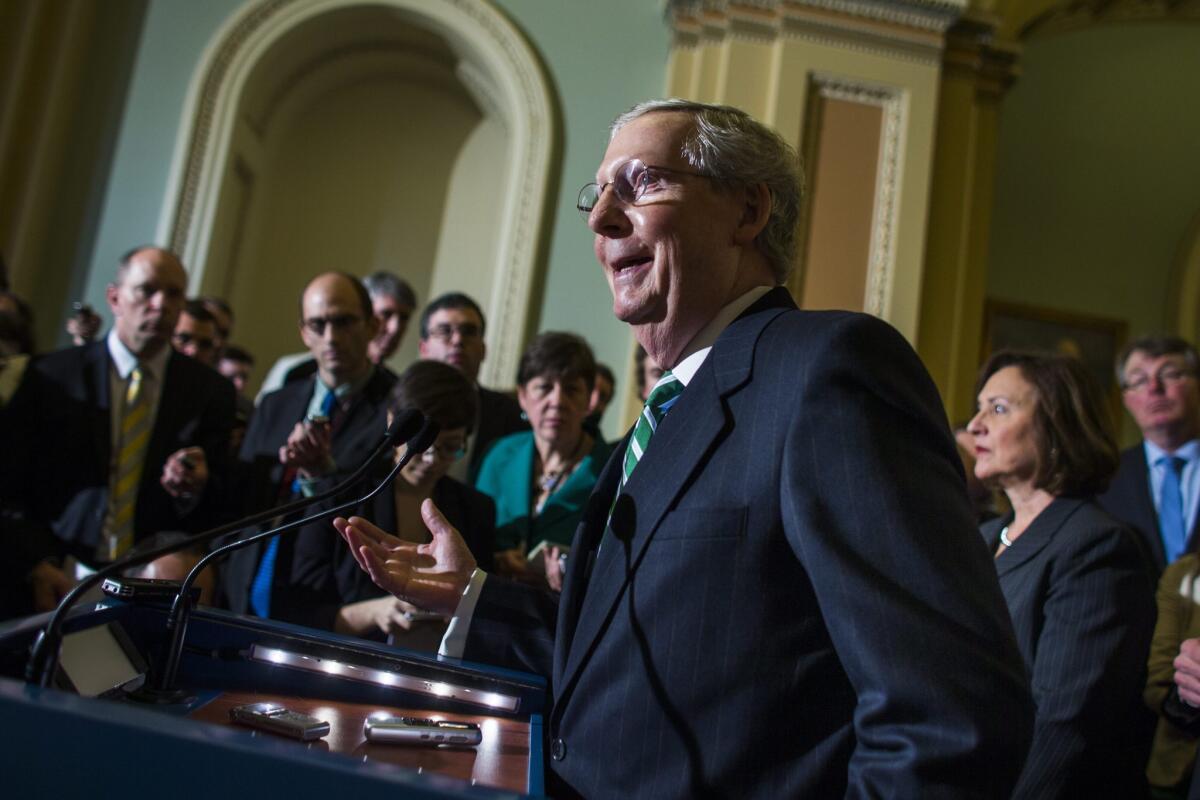Editorial: Time for the Senate to break the impasse over human trafficking bill

- Share via
If ever there were a piece of legislation that should be able to sail through the fractious, politically polarized Congress, the Justice for Victims of Trafficking Act would seem to be it. Introduced by Texas Republican Sen. John Cornyn, the bill has 33 co-sponsors, 12 of them Democrats, including California’s Sen. Dianne Feinstein. Who could be against the bill’s hallmark feature, the creation of a fund to benefit victims of domestic trafficking, financed by assessments on the traffickers themselves?
But no. The bill got stopped in its tracks when Senate Democrats belatedly noticed that the victims’ fund would be covered by the restrictions of the Hyde Amendment, which forbids the use of federal money for abortions. That has ignited a nasty fight, with Democrats accusing Republicans of overreaching by refusing abortion services to trafficked girls and women, and Republicans accusing Democrats of trying to undermine a long-established law.
This page has never approved of the Hyde Amendment, and we have no desire to see its restrictions imposed on this bill or any other, for that matter. But the Hyde Amendment has been the law for many years. A fight over whether a fraction of the projected millions of dollars in aid to victims of trafficking and hunters of traffickers can be used on abortion services seems fruitless, and the bill should not be derailed by such a fight.
Human trafficking is the reprehensible act of forcing or even enslaving people into labor or sex. Anyone under 18 who is recruited into a commercial sex act is automatically considered to be a victim of trafficking.
It’s difficult to know exactly how many trafficking victims there are in the U.S., but advocates say that tens of thousands of people — mostly women, girls, boys, runaways and transgender youths — are preyed upon by sex traffickers.
The bill would provide funds to assist victims and help them get restitution in some cases. It would also provide grants for anti-trafficking law enforcement units and funding for task forces to investigate child trafficking offenses. It would support advocacy centers that focus on child victims of human trafficking. And it would create a Human Trafficking Advisory Council composed of survivors to make policy recommendations to the federal government, as well as a Cyber Crimes Center to provide assistance to investigations of cyber-related crimes.
The bill ramps up penalties for offenders, assessing them a new $5,000 fine. Among those who would have to pay are the trafficking victim’s customers — the johns — if they knew or should have known that the victim was a minor or that the victim had been coerced into sex. This is not an expansion of the law. It had already been established by the courts that such johns could be prosecuted as traffickers, and the bill adds language to the law to clarify that.
There’s nothing wrong with making convicted traffickers pay fines into a fund to aid victims of trafficking. But this bill veers off course when it extends those penalties to other criminals who are not engaged in trafficking.
For instance, the bill would levy the $5,000 fine on people found guilty of sexual abuse, sexual exploitation and creating or selling child pornography. Those are all serious crimes that carry penalties; sexual abuse offenders, as a matter of fact, are already ordered to pay restitution. But to call those people human traffickers is an unnecessary broadening of the definition.
The bill would also fine people who are convicted of illegally bringing people into the country and harboring them. Sure, that could be someone smuggling 10 people across the border and holding them against their will for labor or sex. But it could just as easily be someone helping two friends across the border — a violation of law but hardly human trafficking.
In the end, it’s unlikely that the U.S. will arrest its way out human trafficking any more than it will arrest its way out of the drug trade. That’s why Sen. Pat Leahy (D-Vt.) and Sen. Susan Collins (R-Maine) are offering an amendment to the bill that would concentrate on prevention services and assistance to runaways and homeless youths, who are particularly vulnerable to traffickers. That would be a good addition to this bill.
Follow the Opinion section on Twitter @latimesopinion and Facebook
More to Read
A cure for the common opinion
Get thought-provoking perspectives with our weekly newsletter.
You may occasionally receive promotional content from the Los Angeles Times.









